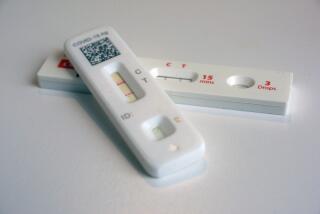Medical labs to get new FDA oversight
- Share via
The Food & Drug Administration on Thursday announced it would step up its regulation of a class of lab tests that have been key in ushering in an era of personalized medicine -- a step the agency has long considered against strong opposition by small labs.
The FDA’s proposal would tighten the agency’s oversight of laboratory-developed tests, which are designed, manufactured and used within a single lab. Most of the tests that would now come under more stringent review are used by physicians and hospitals to help diagnose and treat patients, and they have been widely used to detect certain types of gene-based cancers and guide their treatment.
As medical practice has grown increasingly dependent on genomic analysis, many small or specialized labs have gotten into the business of devising diagnostic tests, tailoring them to the needs of specialized practices, and providing laboratory services to hospitals and physicians.
The FDA has long regulated medical tests developed by companies and licensed for broad use by commercial labs. And it has acted recently to regulate medical and genetic tests marketed directly to consumers. But when labs develop diagnostic tests for their own use, or for the use of specific, related clients (as, for instance, when a hospital lab develops a diagnostic test for its physicians’ use), those tests have not been required to pass FDA muster.
Given the stakes riding on many such tests, the FDA said it needed to step in to ensure that these tests, too, “provide accurate, consistent and reliable results.”
The Centers for Disease Control and Prevention recently reviewed a widely used laboratory-developed test for Lyme disease, and warned that it had “serious concerns” about the test’s rate of false positives and misdiagnosis.
“Inaccurate test results could cause patients to seek unnecessary treatment or delay and sometimes forgo treatment altogether,” said FDA Commissioner Dr. Margaret Hamburg on Thursday. “Today’s action demonstrates the agency’s commitment to personalized medicine, which depends on accurate and reliable tests to get the right treatment to the right patient.”
The FDA’s move drew praise from Rep. Ed Markey (D-Mass.), who has pressed the agency to step in and police the burgeoning business of lab-developed tests.
“Once this guidance is finalized, doctors and patients can rest and test assured knowing that certain high-risk diagnostic tests have been subject to the additional oversight by the FDA that will help ensure that diagnoses based on these tests are sound,” said Markey in a statement released Thursday.
In a July 16 letter to Office of Management and Budget Acting Director Brian Deese, nine leading pathologists warned that increasing FDA regulation of lab-developed tests “would stifle the medical innovation occurring in academic medical centers today, and interfere with our ability to care for our patients.” The letter was signed by nine pathologists who lead clinical and pathology labs at universities across the country, including those at Harvard University, University of Chicago, UC San Francisco, Stanford University and the University of Pennsylvania.
Such tests “have produced some of them most stunning advancements in diagnostic medicine over the course of the past 25 years,” the lab directors wrote. By acting nimbly on biomedical research findings, the directors wrote, academic labs have devised diagnostic tests for cancers and for infectious diseases such as H1N1 infuenza and SARS as much as a decade before large commercial labs could manufacture and broadly market such tests.
The regulatory scheme proposed by the FDA would subject such lab tests to tighter regulation in proportion to the health consequences of the conditions they diagnose. Developers of moderate-to-high risk lab tests would have to submit their tests to the FDA before they can be marketed, demonstrating that they provide accurate results reliably. They would then have to be registered and listed with the FDA, and the labs sponsoring them would be required to forward to the agency “adverse events” reports.
The FDA said it would seek to bring “high-risk” lab-developed tests under its regulatory oversight first, and would, as an interim measure, begin requiring “moderate-risk” tests to be registered and listed with the FDA. In roughly five years, the agency said it would begin requiring those moderate-risk lab developed test to submit to pre-market review of their products.
The proposed guidance is to be published in the Federal Register sometime this fall and would be open for 60 days of public comment and the subject of a public meeting before being finalized.
I keep an eye on FDA’s drug safety mission. Follow me on Twitter: LATMelissaHealy







